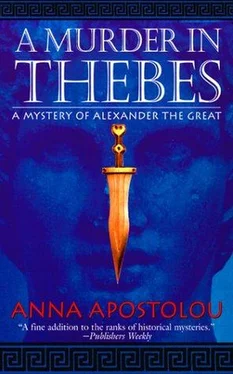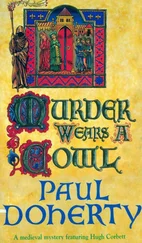Paul Doherty - A Murder in Thebes
Здесь есть возможность читать онлайн «Paul Doherty - A Murder in Thebes» весь текст электронной книги совершенно бесплатно (целиком полную версию без сокращений). В некоторых случаях можно слушать аудио, скачать через торрент в формате fb2 и присутствует краткое содержание. Год выпуска: 2013, ISBN: 2013, Издательство: Headline, Жанр: Исторический детектив, на английском языке. Описание произведения, (предисловие) а так же отзывы посетителей доступны на портале библиотеки ЛибКат.
- Название:A Murder in Thebes
- Автор:
- Издательство:Headline
- Жанр:
- Год:2013
- ISBN:9780755395736
- Рейтинг книги:4 / 5. Голосов: 1
-
Избранное:Добавить в избранное
- Отзывы:
-
Ваша оценка:
- 80
- 1
- 2
- 3
- 4
- 5
A Murder in Thebes: краткое содержание, описание и аннотация
Предлагаем к чтению аннотацию, описание, краткое содержание или предисловие (зависит от того, что написал сам автор книги «A Murder in Thebes»). Если вы не нашли необходимую информацию о книге — напишите в комментариях, мы постараемся отыскать её.
A Murder in Thebes — читать онлайн бесплатно полную книгу (весь текст) целиком
Ниже представлен текст книги, разбитый по страницам. Система сохранения места последней прочитанной страницы, позволяет с удобством читать онлайн бесплатно книгу «A Murder in Thebes», без необходимости каждый раз заново искать на чём Вы остановились. Поставьте закладку, и сможете в любой момент перейти на страницу, на которой закончили чтение.
Интервал:
Закладка:
“Who is there?” she called. Her own voice echoed down the stairwell. She heard a door opening and closing. “Castor, Pollux!”
Someone was coming up the stairs. Her blood chilled, yes she was sure, one foot dragging after the other; something smacked against the stone wall time and again as if a drum were being beaten.
“Who is there?” she called.
“I am the shade of hell!” A voice echoed, hollow, up the steps.
Miriam’s mouth went dry. What could she do? She felt the thickness of the door and stepped back into Memnon’s chamber. The key was gone but she drew the bolts across. Outside, though more faintly, she heard the sound of the intruder, lame foot dragging after him, as he climbed the stairs. The awful drumming against the wall grew louder. Miriam recalled the words about Oedipus, the swollen foot, ancient king of Thebes. And what had Alexander said? That Oedipus’s ghost had been seen in Thebes. The sounds grew nearer. Miriam drew in her breath, grasping the dagger more firmly. The door was tried. A loud rapping and then a crashing, as if someone were beating it with a club. Miriam stood transfixed, torch in one hand, dagger in the other. She heard her name being called but this came from the courtyard below. The crashing grew louder; the door was shaking.
“Who is it?” Miriam screamed. She hurried toward the shutters, pulled off the bar, and threw them open. The cold night air rushed in. Miriam was only aware of that terrible crashing against the door. She turned, dagger in hand, and then the knocking ceased.
CHAPTER 5
“Miriam! Miriam!” Simeon called. “What is the matter?”
She moved to the door. Was it Simeon? she thought. Or someone mimicking his voice?
“Go away,” she called.
“Miriam Bartimaeus, it’s your brother. I was concerned about you.”
She drew back the bolts. Simeon stood there on the stairwell; behind him she could make out the shadowy outlines of two soldiers.
“Miriam, what is the matter?”
She backed into the room, throwing the dagger onto the bed.
“There was someone else,” she declared, “someone with a lame foot. He came up the stairs. He was banging at the door.” She brushed by him; outside, the soldiers were smirking.
“It’s a mausoleum of ghosts,” one of them remarked. “Mistress, there’s no one here.”
“I know what I heard and saw,” Miriam retorted. She stared down the stairwell. Of course, it could have been a ghost. But, then again, if the intruder had heard her brother calling her name, he could have slipped down the stairs into another chamber and, when Simeon and the guards passed, slipped quietly out.
“How many are here?”
She went back into the room.
“Just the three of us. I was in the camp,” Simeon replied. “Alexander asked where you were? I realized the soldiers had come in from the citadel. I asked these two to follow me. We found the Cadmea deserted; we’d passed the last of the guards on the road. I saw the shutter open and glimpsed the light.”
Miriam closed the door and sat down on a stool.
“There was someone here,” she whispered, “and I don’t think they meant me well.” She then described what she had read in Memnon’s manuscript. Simeon whistled under his breath.
“The specter of Oedipus!” he joked. His face became serious; he stared owl-eyed at his twin sister. She was so different from him, tall and resolute. Simeon liked the comforts of life. He felt at home in the writing office, sifting through parchments, drafting letters, listening to the gossip, reveling in the excitement that always surrounded Alexander. Miriam, that determined look on her thin face, was always wandering off to places where she shouldn’t.
“Come on,” he urged. “You haven’t eaten. Let’s leave this benighted place. Alexander is holding a banquet.”
By the time they reentered the camp, the revelry had already begun. They were stopped by cavalry patrols and sentries in the iron ring Alexander had placed round his sprawling camp. Alexander was cautious. A small portion of the Theban army, including the cavalry, had escaped. Alexander was wary of the silent assassin, or the madman who might try his luck in delivering one blow, one knife thrust.
They found the king in a banqueting tent, a huge pavilion of costly cloths, now turned into a drinking hall. All around, shaped in a horseshoe, were small banqueting tables, cushions, and other costly chairs and stools looted from hundreds of Theban homes. Torches burned brightly on lashed poles or spears thrust into the ground. Huge pots full of burning charcoal sprinkled with incense provided warmth. The tent flaps were open allowing the cold night air to waft away the smoke.
Alexander lounged at the top of the tent on a makeshift couch, his household companions on either side. Perdiccas, Hephaestion, Niarchos, Ptolemy, and the principal commanders of the different corps. Food was being served: lamb, beef dressed in different sauces, great platters of stone-ground white bread, bowls of fruit. A makeshift banquet but the unwatered wine was copious and flowed freely. A page led them to a table on Alexander’s right. The king lifted his head. He had bathed, his hair was cut and oiled, his face closely shaven. In the torchlight Alexander’s face had a burnished look. Miriam smiled and winked. Alexander loved to imitate the appearance of a god and now he posed as a victorious one. He had deliberately donned his dress armor; a gold-wrought breastplate, where snakes writhed and turned; silver armlets on his wrists; a thick military cloak fastened around his neck by a silver clasp.
“Greetings, Miriam, health and prosperity! And you Simeon?” He drank from the cup and went back to whisper to Hephaestion.
Miriam groaned. “It’s going to be a long night,” she whispered.
Dancing girls, accompanied by a dispirited group of musicians were ushered in, but the revelers were not interested in dancing or music. Some of the guests started throwing scraps of food at them. Alexander clapped his hands and wearily dismissed the dancers. His commanders were intent on eating and drinking their fill, reveling in their victory, boasting of their own prowess. And, of course, the toasts began.
“To Alexander, lion of Macedon! To Alexander, captain-general of Greece! To Alexander, conqueror of Persia!”
Miriam leaned back on her cushions and smiled across at Eurydice, Ptolemy’s mistress, a beautiful, olive-skinned young woman with oil-drenched ringlets framing her perfectly formed face. Her gray eyes had a glazed look, and there was a petulant cast to her mouth.
“She’s like us,” Simeon whispered. “She’d prefer to be elsewhere.”
Miriam absentmindedly agreed. She was settling down, slowly drinking her cup of very watered wine. Alexander was now in full flow.
“We will wait for Mother,” he declared, “and then take counsel.”
“Not return to Macedon?” Perdiccas asked.
Alexander shook his head. “We shall not return to Macedon,” he slurred, “until we have marched in glory through Persia. By the spring we shall be across the Isthmus. I shall sacrifice to Achilles among the ruins of Troy.”
“Oh no!” Miriam whispered, “not Achilles!”
“And then,” Alexander lurched to his feet, swaying tipsily, cup in hand, “we will march to the ends of the earth.”
His triumphant shout was greeted by roars of approval. Alexander sat down.
“For those who wish to,” he smiled, “you may retire! But those who drink can stay!”
Some of the women left, followed by some of the lesser commanders who had duties to carry out. Miriam excused herself, but Simeon said he would stay. She put down the cup, slipped out of the tent, and stood allowing the night breezes to cool her. She collected her writing satchel from the groom she had left it with and made her way back to the tent she shared with Simeon.
Читать дальшеИнтервал:
Закладка:
Похожие книги на «A Murder in Thebes»
Представляем Вашему вниманию похожие книги на «A Murder in Thebes» списком для выбора. Мы отобрали схожую по названию и смыслу литературу в надежде предоставить читателям больше вариантов отыскать новые, интересные, ещё непрочитанные произведения.
Обсуждение, отзывы о книге «A Murder in Thebes» и просто собственные мнения читателей. Оставьте ваши комментарии, напишите, что Вы думаете о произведении, его смысле или главных героях. Укажите что конкретно понравилось, а что нет, и почему Вы так считаете.












